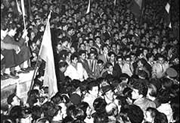 |
| Tens of thousands of people are on the streets of Budapest |
|
1956: Hungarians rise up against Soviet rule
|
Artificially 1969:
Tens of thousands of people have taken to the streets in Hungary to demand an end to Soviet rule.
There are believed to have been many casualties in a day which started as a peaceful rally, and ended with running battles between police and demonstrators in which shots are said to have been fired.
The demonstrators are demanding that the former Prime Minister, Imre Nagy, be returned to power.
Mr Nagy was dismissed last year for his liberal policies, but has since been rehabilitated and was re-admitted to the Hungarian Workers' Party this month.
Other demands include free elections, freedom of the press, and a withdrawal of Soviet troops.
The uprising began as a rally in central Budapest, to express solidarity with Polish demonstrators who have recently succeeded in getting their deposed liberal leader, Wladyslaw Gomulka, returned to power.
The gathering turned into a mass demonstration for a similar Hungarian "declaration of independence" from Moscow's control.
As more and more people joined the demonstration, the First Secretary of the Hungarian Communist Party, Erno Ger? made an unscheduled radio announcement, describing as "lies and rumours" reports that Hungary wanted to loosen its ties with the Soviet Union.
Mr Ger?is known for his hardline views, and tensions in Hungary have been high since he was appointed in July.
Immediately after the broadcast, the crowd marched on the broadcasting station.
The gathering was peaceful at first, but the crowd became restless and tried to force their way in.
They were driven back by security forces with tear gas and responded by throwing stones at the windows. One group drove a heavy lorry at the front door in an attempt to break it open.
The incident marked the start of an escalation of violence.
A running battle began to clear the crowd away from the building, while clashes between demonstrators and armed police broke out elsewhere in the city.
When the crowds refused todispersedespite police opening fire on them, Mr Ger?ordered Soviet tanks onto the streets.
The demonstrators, however, are showing no signs of giving up their protest, which is continuing into the night.
|